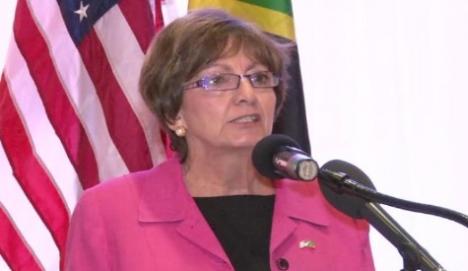
Ambassador Linda Taglialatela (WINN)
Republished by Caribbean News Now with permission of West Indies News Network
BASSETERRE, St Kitts (WINN) — The United States of America has traditionally enjoyed being the Caribbean’s major trading partner and big brother, but massive foreign debt, an enormous fuel bill, a huge import food bill, rising unemployment and the threats posed by climate change have pushed Caribbean countries to seek help wherever its offered, including starting citizenship by investment programmes, and partnering with countries like China and Venezuela to find solutions that work.
In recent years, with high-profile visits to the region by US Vice President Joe Biden in 2013 and US President Barack Obama in 2015, the US has reaffirmed that its interest in what is happening here, in «its backyard», extended beyond stemming the flow of illegal drugs to its shores.
«Hopefully we will be able to move them in a direction that makes them less dependent on fossil fuels and to give them a greater opportunity to reduce electricity costs …as well as become a little more independent and working within their own structure, » said Ambassador Linda Taglialatela, in response to a question about the future of Venezuela’s PetroCaribe — a 2005 initiative that joins 14 countries to an energy co-operation agreement that offers a preferential payment scheme that has helped the Caribbean through its financial storms but now faces new challenges with increased turmoil and political changes in Venezuela.
Taglialatela began her tour of duty in the Caribbean recently and has made courtesy calls to present her credentials. While in St Kitts and Nevis, the ambassador gave a brief update on some elements of US/ Caribbean collaboration that were meeting the region’s challenges head on.
An example of a success story that highlights US efforts to help Caribbean countries develop alternatives to fossil fuel was the technical help offered to St Kitts and Nevis to mine the geothermal opportunities that may exist on Nevis.
«I think we have given them enough assistance… that now they can do some additional work to see if in fact they can develop the geothermal capabilities on Nevis,» she said, while noting the optimism expressed by officials that, if successful, enough energy could be provided to meet local needs and to export.»
As for climate change, the ambassador, while not giving details, said the US was working with countries, as well as the region, to find the options that could help small island states reduce carbon dioxide footprints in reasonable and effective ways.
So, what about China’s growing influence in the region? Is the US concerned that it could cede its traditional role in the region?
«I think that President Obama said it very clearly that he is happy with China’s peaceful rise, and that any and all nations can provide support and assistance to islands such as the Caribbean that will help them with their infrastructure, permitting their education, helping them to develop sustainable economic growth, that we welcome the opportunity,» Taglialatela said.
«I think that the US will continue to be a strong partner; we hope that the Caribbean views us as a strong partner and this is a great opportunity for them to be able to partner with other countries in the world,» the diplomat said.
Disputes in the South China Sea have ratcheted up tension between China and US allies. China’s neighbours have accused it of militarization and American warships recently were on patrol in the region.
Asked if the region should be concerned about China and the US relations in that part of the world, Taglialatela said those were «bilateral issues».
«I think the United States has certain laws, regulations, principles and that we will continue to have those conversations with the Chinese but I don’t think that they will affect our relationship here in the Caribbean,» she said,
